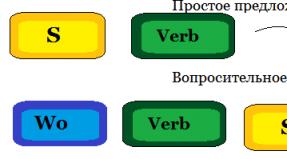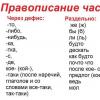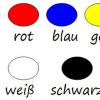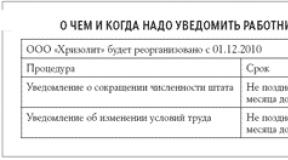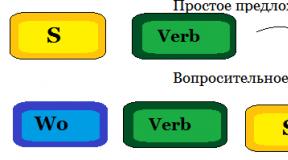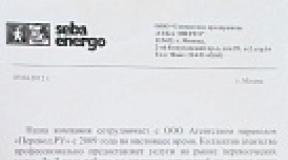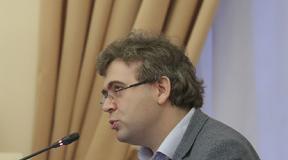Inversion in German. German offers (general information). Word order of the German common simple sentence with complements
Hello dear friends! To construct a beautiful, correct sentence and at the same time accurately express everything you want to say, it is not enough to know the conjugation of verbs and the declension of nouns and adjectives, since the construction of a sentence in the German language has a number of its own features that are not obvious to native speakers of the Russian language.
The Germans love order and adhere to it in everything. This also applies to language. Sentences in German have a special order and strict structure. The word order in a German sentence can be of three types:
- straight
- back
- order for subordinate clauses

In an ordinary declarative sentence, direct word order is most often observed.
Meine Mutter bäckt den Kuchen. — My mother is baking a pie.
In direct word order, the subject comes first, followed by the verb, and then the object.
Reverse word order involves rotation of subject and circumstance. The subject goes behind the predicate, followed by other members of the sentence. The circumstance (usually place or time) comes to the fore.
- Heute muss ich kochen.- Today I need to cook.
- Bald kommt Herr Heinz.- Mr. Heinz will come soon.
Reverse word order is also possible in exclamatory sentences:
- Bist du aber erwachsen! - Well, you’ve grown up!
- Hat der vielleicht lange Haare! - Well, he has long hair!
If there is a modal verb, then the infinitive of the semantic verb goes to the end of the sentence
modal verbs: müssen, können, sollen, möchten, wollen
As soon as you use a modal verb, you must immediately remember that the second verb will go to the end:
Wir mussen ihm heute helfen. - We have to help him.
Same thing with questions: Mussen wir ihm mit seinem Umzug nochmal helfen? — Should we help him move?
In addition, there is also a special word order - for subordinate clauses.
Compare:
- Er kommt heute spät nach Hause. - He will come home late today.
- Ich weiß, dass er heute spat nach Hause kommt. – I know he’s late home today will come.
And finally, the subordinate clause can also appear at the beginning, before the main one:

- About er heute nach Hause kommt, weiß ich nicht. – I don’t know whether he will come home today.
- Warum er heute spät nach Hause kommt, weiß ich nicht. “I don’t know why he’ll come home late today.”
Exercises with answers
Exercise 1. Put the words in the correct order to make a declarative sentence.
- gehe/ich/ins Kino
- Sie/Milch/kauft
- spielen/wir/zusammen
- bin/Anna/ich
- er/Tom/heißt
- in Russland/wir/wohnen
Exercise 2. Make up questions for the sentences from exercise 1.
Exercise 3. Make up negative sentences.
- Ich liebe dich.
- Sie trinkt Tee.
- Wir sprechen Deutsch.
- Er spielt Basketball.
- Du bist stark.
- Ich tanze germen.
Answers
Exercise 1:
- Ich gehe ins Kino.
- Sie kauft Milch.
- Wir spielen zusammen.
- Ich bin Anna.
- Er heißt Tom.
- Wir wohnen in Russia
Exercise 2:
- Gehst du ins Kino?
- Kauft sie Milch?
- Spielen wir zusammen?
- Bist du Anna?
- Heißt er Tom?
- Wohnen wir in Russland?
Exercise 3:
- Ich liebe dich nicht.
- Sie trinkt tee nicht.
- Wir sprechen Deutsch nicht.
- Er spielt Basketball nicht.
- Du bist stark nicht.
- Ich tanze germn nicht.
In German word order is fixed.
What does it mean?
In Russian, we can arrange words in a sentence any way we want. We can arrange the words any way we want. We can arrange the words.
This trick won't work in German: need to know the rules and be sure to place part of the sentence in the place allocated to it.
This is especially difficult for beginners to get used to. That's why we wrote this article to help you maintain German word order.
1. Learn those conjunctions that change the order of words, and those that do not change it
There are different unions that affect the German supply in different ways.
"Normal" word order: Ich werfe den Ball. - I throw the ball.
Predicate in second place, subject on first.
By the way, it is also very important to remember that in a German declarative sentence the verb always comes second(excluding some situations described below)
These are the unions that do not change this order: und, denn, sondern, aber and oder.
Ich renne vorwärts und ich werfe den Ball.
Ich kann den Ball nicht gut treten, aber ich werfe den Ball ziemlich gut.
Entweder sagst du mir die Wahrheit, oder ich werfe dir den Ball ins Gesicht!
Ich bin stark, denn ich werfe jeden Tag im Basketball-Training den Ball.
As you can see, the word order after these conjunctions has not changed: the predicate werfe is in second place, the subject ich is in first place.
And here are those unions that change word order: während, bis, als, wenn, da, weil, ob, obwohl and dass.
We have listed the most popular ones, there are several more. Be careful with them: they “kick out” the predicate to the end of the sentence, changing the word order.
Ich kann ihn nicht leiden, weil er so ein egoistischer Idiot ist. - I can't stand him because he's a selfish idiot.
Actually, the word order should be like this: Er ist so ein egoistischer Idiot. But, as you can see, the weil union has changed this order. The same goes for other unions on this list:
Ich habe auch schon immer gedacht, dass er ein egoistischer Idiot ist.
Obwohl er ein egoistischer Idiot ist, sollten wir nett zu ihm sein.
2. If there is a modal verb, then the infinitive of the semantic verb goes to the end of the sentence
Here are the German modal verbs: müssen, können, sollen, möchten, wollen
As soon as you use a modal verb, you must immediately remember that the second verb will go to the end:
Wir mussen ihm heute helfen. - We have to help him.
Same thing with questions: Mussen wir ihm mit seinem Umzug nochmal helfen? - Should we help him move?
NEVER : Müssen wir helfen mit seinem blöden Umzug?
3. Don't forget about reverse word order
If the first place is not the subject, but the object, then you are dealing with reverse word order. There is nothing complicated about it, the main thing is not to forget that verb - in second place!
It is important not only to replenish your vocabulary with new words, but also to know in what order to place these words when constructing sentences. The topic of this article is word order in a German sentence. There is a direct and reverse order of words in a sentence, therefore, in order to correctly arrange the words in a sentence, first of all you need to determine whether it will be a question, a narrative, or a call to action.
There are three types of sentences in German:
narrative: Ich studiere Deutsch. - I'm studying German.
interrogative: Studierst du Deutsch? – Are you studying German?
incentives: Studieren Sie Deutsch! – Learn German!
Declarative sentence in German consists of a subject (who, what?) and a predicate (what is he doing?), and can also include minor members of the sentence.
Word order in a declarative sentence: the subject comes before the predicate ( direct word order in German):
Ich gehe nach Kiew am ersten September. – I’m going to Kyiv on the first of September.
If the subject comes after the predicate, then we observe reverse word order in German:
Am ersten September gehe ich nach Kiew.– On September 1st I’m going to Kyiv.
It must be remembered that the variable part of the predicate occupies the second position, and the unchangeable part is at the end of the sentence. The unchangeable part can be represented by a prefix, infinitive, predicative:
Wir haben uns in Tscherkasser Theater ein Drama angesehen. – We watched a drama in the Cherkassy theater.
Word order in a question sentence in German
In interrogative sentences without a question word, the variable part of the predicate comes first:
Wohnen Sie in Kiew? - You live in Kyiv?
The unchangeable part of the predicate is in the last position in the sentence:
Wollt Ihr heute abend ins Konzert gehen ? – Do you want to go to the concert tonight?
Questions may begin with a question word ( wo, wann, wie, woher, wohin, warum, wie viel, womit, wer, was, welcher, welche, welches). In this case, the variable part of the predicate will be in second place, and the unchangeable part will take the last position in the sentence:
Was schriebt er ab ? -What is he copying?
Word order in an incentive sentence in German
The changeable part of the predicate should come first, and the unchangeable part should come last:
Lies laut! - Read it loud!
Lies den Text laut vor! – Read the text loudly!
Secondary members of a sentence do not have a permanent place in a simple sentence. They are placed depending on the order of words - direct or reverse, as well as on whether the predicate consists only of a variable part, or includes an unchangeable one.
The German (German) language, like the Germans themselves, loves clear rules. To correctly compose a simple German. sentence (sentence) you only need to follow a few rules.
In him. sentence There are two main members of the sentence that are required: subject and predicate(tale): Man tanzt. - They are dancing. Er schläft. - He's sleeping. Es schneit. - Snowing.
German tale always contains a verb (verb), but in translation it does not always appear in order to avoid tracing: Sie ist Studentin. - She is a student. Ich bin 22 Jahre alt. - I am 22 years old.
Depending on the type of sentence. ( narrative, interrogative (question), incentive sentence.) the predicate occupies a certain place: Tim liest das Buch. Tim is reading a book. Hast du Geschwister? - Do you have any brothers or sisters? Gib mir bitte deinen Bleistift! - Give me your pencil please!
IN simple german sentence, which has a narrative character, a conjugated verb. always comes in second place: Ich mache eine Hausaufgabe. - I'm doing my homework. Monika hilft
ihrer Mutter. Monica helps her mother.
If the subject comes first, then in the sentence. direct word order: Wir gehen am Abend in die Disko. - We are going to a disco in the evening. Er spielt Tennis um 17 Uhr. – He plays tennis at 17 o’clock.
If the subject comes after the verb, then this word order is called reverse. In this case, some minor member of the sentence comes first: Am Abend gehen wir in die Disko. - In the evening we go to a disco. Um 17 Uhr spielt er Tennis. – At 17 o’clock he plays tennis.
In simple it. sentence The conjugated form of a verb can also be part of a compound predicate. Another, unconjugated form of tale. (or just part of a verb) is in the last place of the sentence: Du hast schon diesen Film gesehen. – You’ve already seen this film. Ich muss noch mein Zimmer aufräumen. – I still have to clean my room. Die suppe wurde gekocht. - The soup is cooked.
Interrogative sentences are divided into two types:
1. question sentence with question in a word;
2. question sentence no question words.
In the first version, the word order is as follows: question. word, spoken word, subject, minor members of the sentence. (if there are any): Wo wohnst du? - Where do you live? Was ist deine Mutter von Beruf? – Who is your mother’s profession?
In question sentence no question word conjugated verb. comes at the beginning of a sentence. The subject comes immediately after the verb: Kannst du mir helfen? - Can you help me? Hast du schon deine Oma be sucht? – Have you already visited your grandmother? Studiert er Deutsch? – Is he studying German?
Incentive sentence expresses an order, request, wish, advice, prohibition and command. In these sentences The forms most often used are Imperative and verb. comes first: Zeigen Sie mir bitte diesen Anzug! – Show me this suit, please! Geh an die Tafel! - Go to the board! Helft den Alten! - Help the old people!
Position of minor members of the sentence. is relatively free. Simple German sentence structured in such a way that it begins with known information and moves on to unknown information: Inge fehlte heute wegen einer Erkältung. – Inga was absent today due to a cold.
To construct a beautiful, correct sentence (sentence) and at the same time accurately express everything you want to say, it is not enough to know the conjugation of verbs and the declension of nouns and adjectives, since the construction of a sentence. in the German language has a number of its own features that are not obvious to native speakers of Russian.
In order to compose a sentence, we need to decide what we want to express: convey information (narrative sentences are used for this), ask a question (interrogative) or call someone to action (motivating).
I. Word order in a German declarative sentence
Speaking about the construction of sentences, Germans sometimes compare them to a verbal orchestra, where the verb plays the role of a conductor and determines the place and time of entry into play of each instrument (member of the sentence), while itself usually remains in the background.
So, the verb (predicate) in a narrative sentence. takes second place, while it is not so important what comes first. Unlike English, the subject of an action does not always precede the predicate. In written speech, the first position is often used as a link to previous information, and in oral speech it emphasizes something important, while being highlighted intonationally.
| Ich | lebe | in Germany |
| Mein Bruder | studiert | Medizin in Munich. |
| Von meiner Kindheit an | glaubte | ich an die große Liebe. |
| Dieses Buch | schenke | ich niemandem. |
If a predicate (predicate) consists of two parts, then the second part comes at the end of the sentence.
Beim Fahrradfahren sollen die Kinder Helme tragen.
Ich werde mich nie mehr verlieben.
Meine Eltern haben 2 Jahre in Afrika gearbeitet.
At first glance, everything is simple. BUT! Everything that comes between the two parts of a predicate is called Mittelfeld in German, and the word order here is governed by a number of rules.
- Pronouns take precedence over nouns, i.e. stand in front of him, regardless of cases.
Ich habe ihm mein Auto geliehen.
Er hat mir diese Uhr geschenkt.
- Sequence of nouns: Nominativ, Dativ, Akkusativ, Genetiv.
Die Mutter hat ihrer Tochter (D) eine schöne Puppe (A) gekauft.
Heute hat die Lehrerin(N) ihren Schülern (D) ein neues Thema(A) erklärt.
- Sequence of pronouns: Nominativ, Akkusativ, Dativ.
Die Lehrerin hat heute ihnen ein neues Thema erklärt.
Heute hat sie(N) es(A) ihnen(D) erklärt.
- Circumstances obey the TEKAMOLO rule: TE = temporal (time); KA = kausal (reason); MO = modal (mode of action); LO = lokal (place). This means that in the sentence. first come the circumstances of time (answer the questions when? how long? how often?), then the circumstances of the cause (answer the questions why? for what reason?), followed by the circumstances of the manner of action (answer the questions how? how), and they are closed by the circumstances of the place (answer the questions where? where? from where?).
Ich fahre morgen (temporal) mit dem Zug(modal) nach Berlin (lokal).
Ich war gestern zwei Stunden (temporal) wegen des Schneefalls (kausal) im Stau (modal) stehengeblieben.
- Known information (with definite articles) precedes unknown information (with indefinite articles).
Ich habe der Tochter meiner Freunde ein Kleid gekauft.
Peter hat den Eltern ein neues Restaurant empfohlen.
- Direct objects in the Accusative (A) and Dative (D) cases precede indirect objects (preposition + object).
Die Mutter hat ihrem Sohn(D) eine neue Jacke(A) aus Baumwolle(Präposition + D) gekauft.
Ich habe gestern einen Brief(A) an meinen Anwalt(Präposition + A) geschrieben.
- Circumstances usually stand between two additions.
Du musst dir unbedingt diesen Film anschauen.
Ich danke Ihnen herzlich für Ihre Hilfe.
Considering the construction of a sentence. In the German language, in particular declarative sentences, it is also worth paying attention to the word order in complex sentences.
Word order in complex sentences
Complex sentences – those in which there are 2 or more grammatical stems, i.e. 2 or more subject and predicate. There are complex and compound sentences. Compound compounds in the German language include sentences. with the conjunctions aber and und. The word order in them is the same as in simple sentences.
Meine Eltern haben mir vom Ehebruch abgeraten und später habe ich verstanden, dass sie Recht hatten.
As for complex sentences, in the main part (Hauptsatz) the word order is normal, and in the subordinate part (Nebensatz) it is reversed, i.e. the verb comes at the very end of the sentence.
Ich bin gestern ganzen Tag spazieren gegangen, obwohl es ziemlich kalt war.
Ich wusste überhaupt nicht, dass du heiraten wolltest.
Ich weiß nicht, ob alle meine Freunde zur Party kommen.
II. Word order in a German question sentence
In the German language, there are 2 types of questions: general (which can be answered yes/no) and special (asked using a question word).
In a general question, the verb - the predicate - is placed in the first position, then all other members of the sentence; if the predicate consists of two parts, then the second part, as in a narrative sentence, comes at the end.
Magst Du Haustiere?
Bist du gestern gut nach Hause angekommen?
Könntest du mir bitte helfen? (question-request).
In special questions, the question word comes first, the verb comes second, then all the other members of the sentence.
Warum hast du mich nicht angerufen?
Wie lange haben Sie in Russland gelebt?
Wo best du geboren?
III. Word order in a German imperative sentence
Incentive sentence expresses a call, an incentive, a requirement for action. It is usually expressed using an imperative (imperative mood). Their main difference is that the verb comes first, and the sentence comes at the end. usually an exclamation point. In oral speech, sentence. pronounced with rising intonation. The subject in such a sentence. may not be, especially when addressing 2l.un.h (du), when politely addressing Sie, the subject comes after the verb.
Warte auf mich bitte!
Räum dein Zimmer auf!
Bleiben Sie bitte ruhig!
Read also...
- What particles are written with a hyphen in Russian Spelling particles separately and with a hyphen
- Test to determine the level of German language proficiency (A1)
- Test DaF – what is it and what is it for?
- Reorganization of an educational institution Order on reorganization in the form of a merger sample
